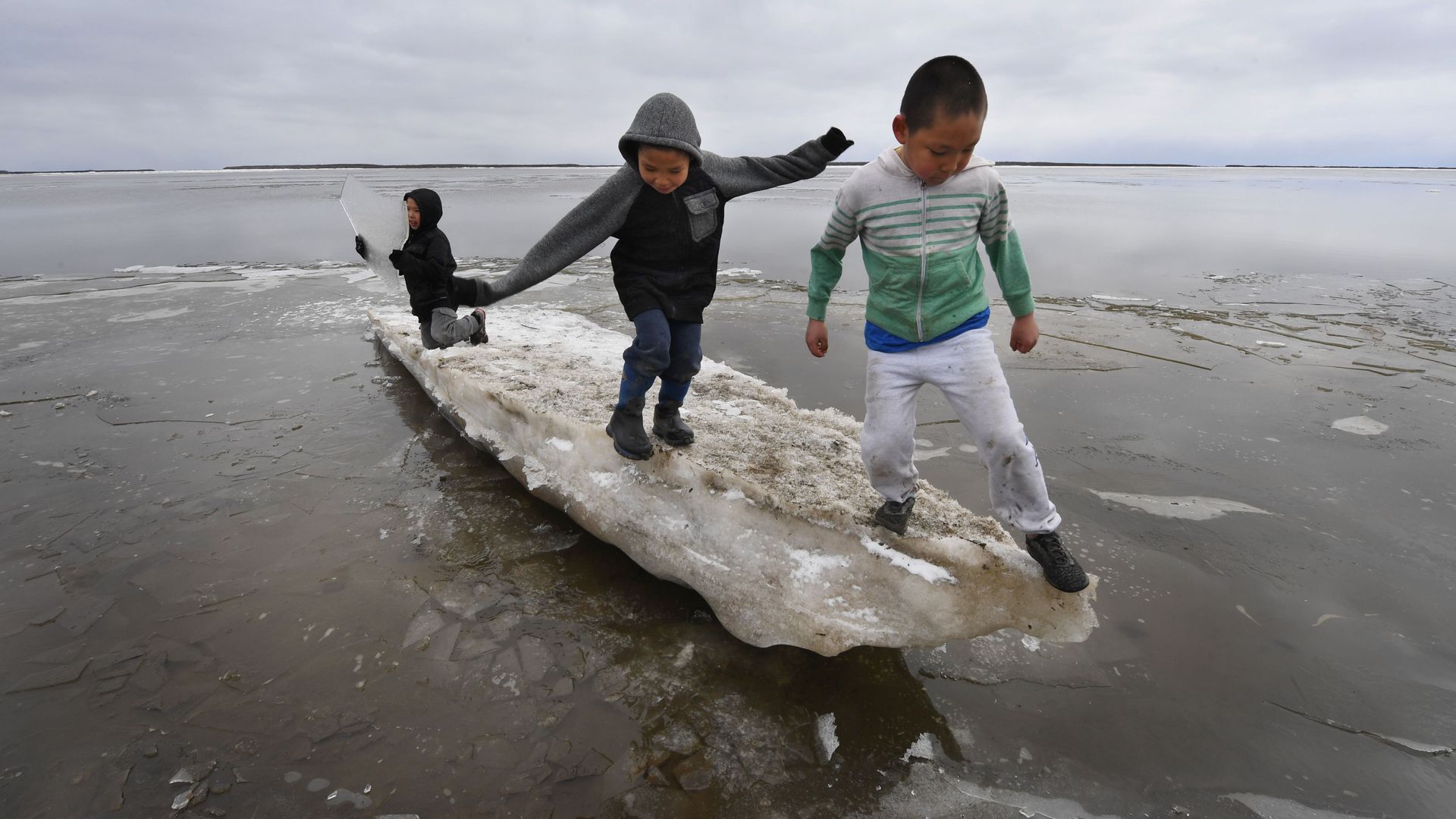UN report: Climate change causes and impacts are increasing
Add Axios as your preferred source to
see more of our stories on Google.

Children on melting ice at the climate-change impacted illage of Napakiak on the Yukon Delta in Alaska in April. Photo: Mark Ralston/AFP/Getty Images
As world leaders gather in New York City for the United Nations Climate Action Summit Monday, a UN report warns climate change is accelerating — with the Earth on track for the warmest 5-year period on record.
"Climate change causes and impacts are increasing rather than slowing down. Sea level rise has accelerated and we are concerned that an abrupt decline in the Antarctic and Greenland ice sheets, which will exacerbate future rise. As we have seen this year with tragic effect in the Bahamas and Mozambique, sea level rise and intense tropical storms led to humanitarian and economic catastrophes."— World Meteorological Organization Secretary-General Petteri Taalas
The big picture: Data compiled by the World Meteorological Organisation for the report, to be presented to the UN summit, shows the average global temperature for 2015–2019 is on course to be the warmest of any equivalent period on record.
- "It is currently estimated to be 1.1°Celsius (± 0.1°C) [about 2°F] above pre-industrial (1850–1900) times," the UN said in a statement accompanying the "United in Science" report.
- To stop a global temperature rise of more than 2 degrees Celsius above pre-industrial levels and meet the goals of the 2015 Paris climate agreement, countries must triple climate emission cut targets, the report warns.
Key findings:
- Accelerating climate impacts from melting ice caps to sea-level rise and extreme weather are responsible for the warming, researchers say, with the global average temperature increasing 1.1°C above pre-industrial (1850-1900) times and 0.2°C (or .36°F) warmer than 2011-2015.
- Carbon dioxide concentrations in the atmosphere increased at a higher rate in the 2015-2019 period than in the previous 5 years and are on course to reach a record 410 parts per million this year.
- Sea levels have risen an average of 5mm (0.2 inches) a year in the past 5 years, compared to 3.2mm (0.13 inches) a year on average since 1993, and much of the increase is from melting glaciers and ice sheets.
- The Antarctic ice sheet's annual ice losses increased at least 6-fold, from 40 gigatonnes (Gt) per year in 1979-1990 to 252 Gt per year in 2009-2017.
What they're saying: WMO Secretary-General Petteri Taalas, who is co-chair of the Science Advisory Group of the UN Climate Summit, said in a statement it's important that we reduce greenhouse gas emissions, "notably from energy production, industry and transport" if we're to tackle the issue effectively.
- "To stop a global temperature increase of more than 2 degrees Celsius above pre-industrial levels, the level of ambition needs to be tripled," he said. "And to limit the increase to 1.5 degrees, it needs to be multiplied by 5."
The other side: UN Secretary General António Guterres said he's hopeful of avoiding a climate catastrophe after seeing "new momentum" from countries and businesses pledging to act to meet targets, along with the rise of a global climate movement led by young people, the Guardian reports.
Go deeper:
- Climate change's crucial moment
- In photos: Hundreds mourn Swiss glacier's loss to global warming
- Massive companies' green commitments can't save the planet
Correction: This article has been updated to fix the conversions from Celsius to Fahrenheit. The original version stated that 1.1°Celsius = 34°F, instead of the correct 1.98°F.
